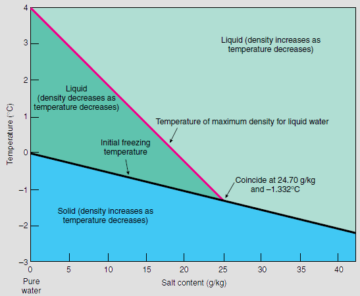Elise Cutts at Quanta:
 We learn in grade school that water freezes at zero degrees Celsius, but that’s seldom true. In clouds, scientists have found supercooled water droplets as chilly as minus 40 C, and in a lab in 2014, they cooled water to a staggering minus 46 C before it froze. You can supercool water at home: Throw a bottle of distilled water in your freezer, and it’s unlikely to crystallize until you shake it.
We learn in grade school that water freezes at zero degrees Celsius, but that’s seldom true. In clouds, scientists have found supercooled water droplets as chilly as minus 40 C, and in a lab in 2014, they cooled water to a staggering minus 46 C before it froze. You can supercool water at home: Throw a bottle of distilled water in your freezer, and it’s unlikely to crystallize until you shake it.
Freezing usually doesn’t happen right at zero degrees for much the same reason that backyard wood piles don’t spontaneously combust. To get started, fire needs a spark. And ice needs a nucleus — a seed of ice around which more and more water molecules arrange themselves into a crystal structure.
The formation of these seeds is called ice nucleation. Nucleation is so slow for pure water at zero degrees that it might as well not happen at all. But in nature, impurities provide surfaces for nucleation, and these impurities can drastically change how quickly and at what temperature ice forms.
more here.
